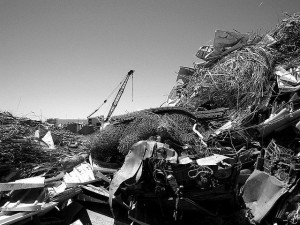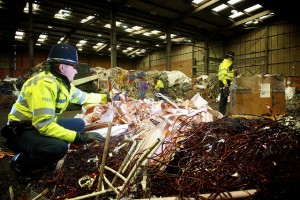 While to the average person, a salvage or recycling facility may not seem like a susceptible business, owners know there are considerable threats to its security. In the United States and internationally, as the economy fluctuates, creating high highs and low lows, raw materials, especially metals, maintain a certain value. Scrap metals are actively sought after as they are continuously recycled and reused. According to the Bureau of International Recycling they are frequently added to new metal production.
While to the average person, a salvage or recycling facility may not seem like a susceptible business, owners know there are considerable threats to its security. In the United States and internationally, as the economy fluctuates, creating high highs and low lows, raw materials, especially metals, maintain a certain value. Scrap metals are actively sought after as they are continuously recycled and reused. According to the Bureau of International Recycling they are frequently added to new metal production.
In economic recessions people have more of a reason to commit crimes, especially theft in order to turn a profit. Even during periods of financial stability, there are people that will steal, and cause damage to businesses in an effort to make a quick buck. Scrap metals tend to be a target for thieves as they can yield a decent and quick profit. You would think stealing scrap metal would be difficult given its potential weight and size, but where there’s a will, there’s a way. Plus, many facilities are vast in area making it difficult to keep an eye on what is happening, and perimeter fences can only do so much. Fortunately, many states have existing legislation to help prevent such substantial loss, but there are steps you can take as a business owner to stop crime in its tracks. By installing a comprehensive security system at your facility you will be decreasing potential loss and damages, both physical and financial. Here at Perfect Connections Inc. we understand the challenges you face trying to secure your facility. With decades of experience, our professionals can help you prevent theft and devastating loss. As Megan Workman for Recycling Today notes, “As prices for copper and brass have increased, scrap metal processors say it has become necessary to expand security measures at their yards.”
Existing Issues
What are the security issues surrounding salvage and recycling facilities, and why are they a prime target for theft? For one, they typically house valuable metals such as copper, aluminum, platinum, bronze, zinc, nickel, and catalytic converters which are full of precious metals like palladium and rhodium. Depending on the market value, which is fluctuating daily, such items can fetch a pretty penny. Many salvage yards and recycling facilities can be, if not fully, partially exposed to the outdoors, making them more susceptible to criminal activity. Another problem these facility’s owners/buyers face is when customers attempt to sell material, it’s hard to tell if that person is actually who they say they are, and if the items they are trying to sell are stolen or not. Never mind the legal implications that come with buying stolen material, your company’s reputation could be at risk if the public believes you’re aiding criminal activity, whether it’s by accident or ignorance. The damages incurred by metal theft can be extremely costly as well. Cases of metal theft in the United States costs businesses an estimated $1 billion annually, according to the U.S. Department of Energy.
Stolen metals/scraps is not only an issue for the buyers, it causes all sorts of trouble for the sources of the stolen items. When thieves steal they’re not only stealing from other scrap or salvage facilities, they hijack material from personal cars, railroad tracks, public transit, abandoned or unprotected homes, warehouses, construction sites, and anywhere else there’s opportunity. They’re not only a danger and nuisance to the public, but themselves as well. According to Earth911.com a man in Arizona was found with burns covering his entire body because he was attempting to steal copper from a transformer. Not only did he hurt himself, he inadvertently cut power to 1,400 customers.
While criminal statistics can be broken down into many categories, metal related theft is unfortunately not one covered by the FBI Uniform Crime Report, which is “the most widely used crime database in the country. ” This makes it difficult to get an accurate national reading on this type of crime. However, many states have implemented their own legislation to help deal with and track salvage/recycling facility theft and illegal purchases.
Protecting Your Business
 As the issue of metal theft has become more prominent, stricter state legislation has been and will continue to be implemented. Partnering with the local authorities and reporting crimes or suspicious activity/behavior are crucial components in decreasing salvage/recycling facility crime rates. While laws and regulations can help significantly, there are always people who are willing to break or bend the rules, which is why it’s advantageous to reinforce your facility with a comprehensive security system.
As the issue of metal theft has become more prominent, stricter state legislation has been and will continue to be implemented. Partnering with the local authorities and reporting crimes or suspicious activity/behavior are crucial components in decreasing salvage/recycling facility crime rates. While laws and regulations can help significantly, there are always people who are willing to break or bend the rules, which is why it’s advantageous to reinforce your facility with a comprehensive security system.
Legislation
Being a salvage/recycling facility owner you may already know that there are different state requirements when it comes to the purchase and tracking of metals, and the identification of selling customers. For example, in September 2014 a New Jersey bill was passed stating that scrap metal business are, “to maintain, for at least 18 months, a record of all receipts or purchases of scrap metal, instead of only for those purchases in excess of 100 pounds or $50, as currently provided by law.” The bill also stipulates that payments are to be made by check to that person or their company, mailed to their personal/company address. Cash payments are permissible as long as a photographic record of the seller is maintained. Keeping records of customers will help business owners and police track stolen material and illegitimate individuals. It will also let the seller know you mean business. If you are unsure of your states current rules and regulations you can visit the Institute of Scrap Recycling Industries, Inc. They offer a summarized compilation of state metal theft laws that was last updated on September 30th, 2014. There is also a website geared toward preventing and catching scrap metal theft, it’s called scraptheftalert.com. Becoming a member of this website gives you the advantage of being alerted and alerting others within the industry when an incident has been reported within a 100 miles radius of your location.
Security
With stricter laws and law enforcement, salvage and recycling facilities have a better chance of avoiding criminal activity. Nevertheless, people are always willing to break the law, especially if they see easy opportunities. The law won’t prevent someone from climbing over the gates of your facility, it won’t stop someone from trespassing, and it will not stop criminals from seeking out the weaknesses in your facility for easy access. Your best line of defense is installing a comprehensive monitored alarm system that includes surveillance, motion detectors, access control, automatic lights, and a fence.
 Erecting a fence is your first line of defense as it guards the perimeter of your facility. It’s great until someone cuts through it, climbs it, or digs under it. Maybe you have automatic or motion activated lighting throughout your facility as well. Lighting can be a powerful deterrent, but it may not be enough. If you really want to manage your security it’s imperative to install a monitored surveillance system. Cameras can not only deter a potential threat, but help you and the police catch the perpetrator/s. You can even access footage of activity at your facility remotely from the convenience of your mobile device or home computer. Notifying the public of your camera surveillance through posted signage will help prevent potential crime as well.
Erecting a fence is your first line of defense as it guards the perimeter of your facility. It’s great until someone cuts through it, climbs it, or digs under it. Maybe you have automatic or motion activated lighting throughout your facility as well. Lighting can be a powerful deterrent, but it may not be enough. If you really want to manage your security it’s imperative to install a monitored surveillance system. Cameras can not only deter a potential threat, but help you and the police catch the perpetrator/s. You can even access footage of activity at your facility remotely from the convenience of your mobile device or home computer. Notifying the public of your camera surveillance through posted signage will help prevent potential crime as well.
David Guz, the president of H & H Metals in Michigan owns a 15 acre facility. He was recently interviewed for Recycling Today on how he manages efforts to avoid theft from his sprawling yard. Not only is communicating with local authorities a major factor, but “After 36 years in business, Guz says he has just about seen it all, while the “state-of-the-art” security system he had installed three years ago helps him to really see everything that goes on in his 15-acre yard at any time.” His security system includes surveillance equipment, motion detectors, access control, and monitoring services. Combining all of these security components along with fencing and automatic lights, can significantly decrease catastrophic loss and damage to your business, saving you time, money, and aggravation.
Before you dive in to the seemingly endless world of security options, be sure to have a licensed professional assess your security risks in person. If you are located in Northern or Central New Jersey, our team of experts at Perfect Connections, Inc. can help analyze potential weak spots and customize a security system solution that best suits your business’s needs. Don’t wait for tragedy to strike, stay a step ahead of the criminals and protect what you’ve worked tirelessly for.
If you live in Central or Northern New Jersey and would like information on any of the topics discussed above, please call 800-369-3962 or simply CLICK HERE.
Image Credits: Image #1 by Dave Parker-Flickr-Creative Commons, Image #2 by West Midlands Police-Flickr-Creative Commons, Image #3 by Dan4th Nicholas-Flickr-Creative Commons
